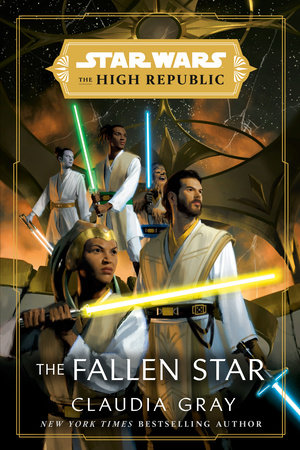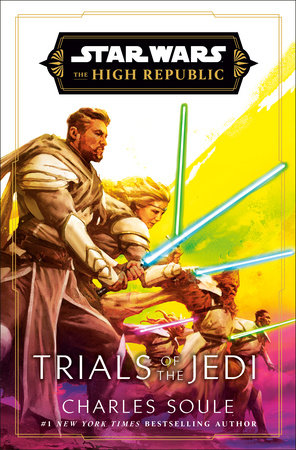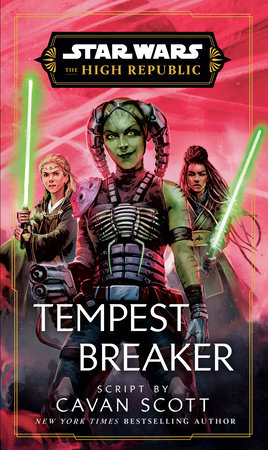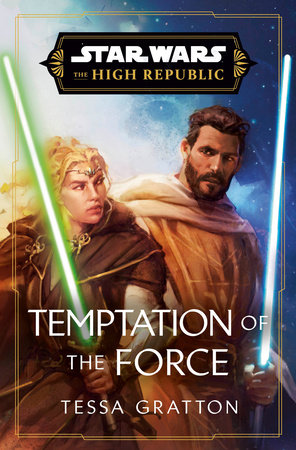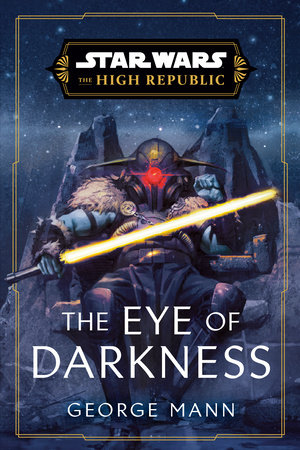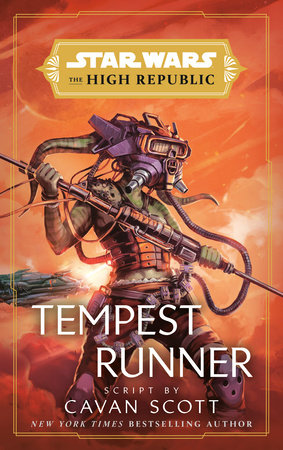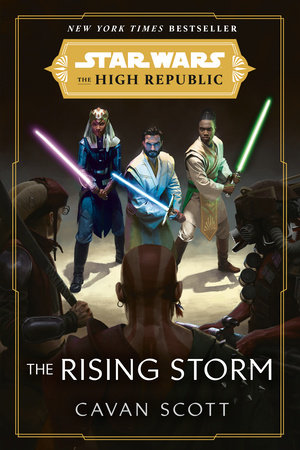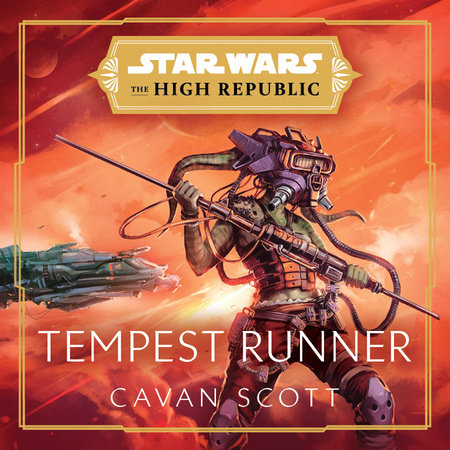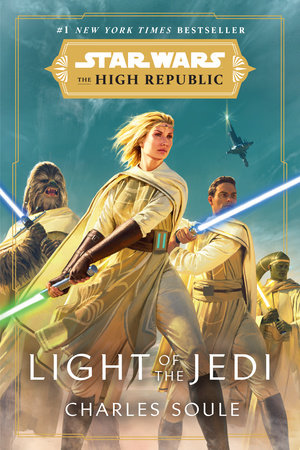Excerpt
Star Wars: The Fallen Star (The High Republic)
Chapter 1Stellan Gios was among those Jedi who perceived the Force as the entire firmament of stars in the sky. Points of brilliant heat and energy, seemingly distanced from one another by infinite absence and cold—but actually profoundly connected. Families, friends, tribes, organizations: Each formed a different constellation, carving shape and meaning from the sky. (Were not he, Avar Kriss, and Elzar Mann such a constellation? Stellan had always thought so, even in childhood.) The Force shone forth from them all, illuminating the vast dark; if Stellan but had the ability to perceive every living being, it would have the same effect as being able to see every star in the universe at once: total, pure, all-encompassing light.
Rarely had he felt so close to that ideal moment as he did on this day.
Colorful banners streamed in the sunshine, fluttering over a throng of thousands who were laughing, eating food from tents and carts, and enjoying the beautiful day and—at last—a sense of true safety and belonging. Or so Stellan liked to think.
Finally, he thought, we’ve regained the joy the Nihil stole from us for so long. At last we can celebrate our unity the way we should’ve been able to from the beginning.
Stellan stood at the head of the Starlight delegation upon a dais that overlooked the celebration. In the eyes of most of the galaxy, Eiram was an insignificant place, a tiny dot on a star chart too obscure to bother with. But this had been one of the worlds that had led the campaign for this part of space to finally join the Republic, which made their recent mission here all the more symbolic.
Eiram had recently suffered a storm—the kind of vicious cyclone only a handful of planets could muster, one that had at its apex covered almost an entire hemisphere. Terrible winds had badly damaged the desalination structures that supplied the planet’s only fresh water. This was a crisis that would devastate an independent planet, leading to a mass exodus or even starvation.
But planets in the Republic had a reason to hope.
“And so, instead of returning to its place in the heavens, Starlight Beacon was transported here, to Eiram!” The storyteller gestured at the holo that showed Starlight being towed through outer space, for only the second time ever, following a lifesaving mission to the planet Dalna. Ringed around the storyteller, dozens of children oohed and aahed in wonder. The shimmer of the holo was reflected in their bright eyes. “The Republic and the Jedi came to save us all, by bringing us water, supplies, and most of all . . . hope.”
Stellan felt a faint twinge of regret that he hadn’t been here to personally oversee the station’s moving and the beginning of the repairs. He’d still been on Coruscant then, so he’d tasked Master Estala Maru with supervising every step—not because he doubted the specialists, but because it was so important for this to be absolutely right. Nobody in the galaxy paid more attention to detail than Maru.
Upon Stellan’s return two days prior, the repairs for the desalination plant weren’t entirely complete. All they had to do now, however, was attach the sluice gates—something that would be accomplished as soon as the tow craft were available, a week or two at most. The people of Eiram might still have water rationing in place, but the rations were generous, and after several weeks of hardship the planet was ready to celebrate.
Stellan said as much to Maru, who replied, “Right. It’s the perfect time for everybody. But it doesn’t hurt that this is when the chancellor happened to be free.”
“Such is the state of politics,” Stellan said.
In truth, it was good of Chancellor Soh to have made the time to attend, even holographically. The flickering images next to him on the dais saw her sitting comfortably in an informal chair, her enormous targons lying on either side of her, dozing in the contentment of beasts. Stellan’s eyes met Lina Soh’s, briefly—each sharply conscious of the memories of the Republic Fair. The image of Stellan lifting her unconscious body from the rubble had already become iconic: both of the evil of the Nihil, and of the resilience of the Republic. Thus the two of them were in a strange way bound together in the public eye; in the same way, Stellan had become the Jedi, the symbol of the Order.
“If we’re a constellation,” Elzar Mann had said, before leaving for his retreat, “the Council has made you the polestar.” Stellan would’ve liked to disagree, but he couldn’t.
Stellan wasn’t sure how he felt about that. So he was guiltily relieved that the chancellor hadn’t attended in person. Otherwise there would’ve been pressure to come up with some new iconic image, somehow.
From the Jedi Council, his fellow members Masters Adampo and Poof watched via their own holograms as well. Cam droids hovered amid the streamers and balloons, capturing the event for people from Kennerla to Coruscant. No matter how distant this part of the frontier might be from the Galactic Core, the people of Eiram could know themselves to be truly as much a part of the Republic as any other world.
“They’ve needed this,” Stellan murmured as he looked out at the revelry of the crowd.
Maru surprised him by answering, “We’ve needed this.”
And that was the truth of it. Stellan’s keen gaze picked out white-and-gold-clad figures among the festival-goers: Bell Zettifar and Indeera Stokes, sipping bright-orange ram’bucha from their cups; Nib Assek helping OrbaLin to make his way toward the dancers, the better to watch their performance; and Burryaga, playing with some of the tinier children. Being a Jedi was a sacred duty—but the light demanded more than obedience and sacrifice. Sometimes a Jedi had to be open to the simple, pure experience of joy. Today they all had that chance.
“A fine thing to see, isn’t it?” Regasa Elarec Yovet of the Togruta was there in person, standing near the flickering image of Chancellor Soh.
It was the chancellor who answered, though Stellan entirely agreed: “It is, Your Majesty. And it’s about time.”
“It is almost time, my lord,” said Thaya Ferr.
Marchion Ro gave his underling the slightest nod as he stared into the depths of the holographic star chart. His preselected targets glowed red among the whiter stars, and he studied each one in turn.
These were ordinary worlds. Large and prosperous enough to be of note at least to neighboring systems, not so large as to have strong planetary defenses or to draw undue attention. He walked through the holographic chart, imagining the suns and planets pushing apart to let him pass.
The worlds he had chosen had two things in common: First, they all had good communications systems that would allow them to reach officials on Coruscant within minutes.
Second, they were all very, very far from Starlight Beacon.
He smiled his bloodless smile. “Begin.”
Aleen: a planet neither particularly obscure nor noteworthy. Although Aleen had been racked by wars in its distant past, it was now a place where nothing of significance had happened in a very long time—even by its own inhabitants’ reckoning—and nothing of significance was anticipated for perhaps an even longer time to come. The legends of the wars were enough to make every soul on Aleen satisfied with an uneventful life.
Yeksom: one of the longest-standing Republic member worlds on the Outer Rim, one that had suffered terrible groundquakes in recent years. The Republic was helping the planet rebuild, but it was a protracted, painstaking process. Its people remained guarded, uncertain, sad-eyed; everyone had lost someone in the quakes, and grief veiled the world’s gray sky.
Japeal: a planet on the frontier, newly bustling, with no fewer than three small space stations in various stages of construction. Its temperate climate and plentiful water practically invited settlers to find a place they might call their own. Dozens of species set up storefronts and eateries; engineers mapped bridges and roads; families put finishing touches on brand-new, prefab homes.
Tais Brabbo: Anyone on Tais Brabbo who wasn’t up to no good had taken a wrong turn somewhere. Rumor had it the Hutts had considered moving some operations onto Tais Brabbo but decided against it—the place was too corrupt even for them. It was a good place to get lost, and on any given day it housed millions of souls who wanted nothing more than to remain out of sight of any authorities more powerful than the ineffectual local marshals.
On each of these very different planets, under four different shades of sky, millions of very different individuals were going about tasks as divergent as spinning muunyak wool or taking bounty pucks when they each heard the exact same sound: the thudding hum of spacecraft engines descending.
All those millions of people looked up. They all saw Nihil ships streaking down out of the sky—numerous as raindrops—the beginning of the Storm.
Explosives dropped. Plasma weapons fired. The assault slammed into homes, factories, bridges, cantinas, medcenters, hangars. There was no specific target, because everything was a target. It seemed the Nihil wanted to cause mayhem for mayhem’s sake, which nobody who had heard of them found difficult to believe.


